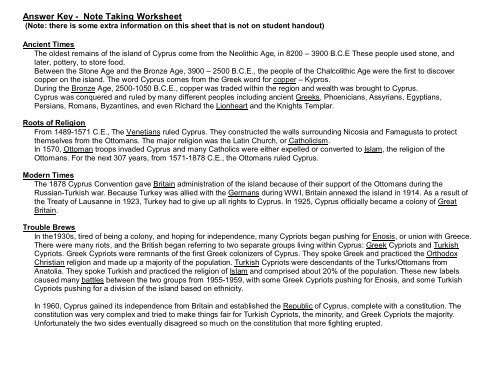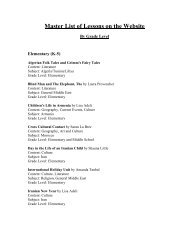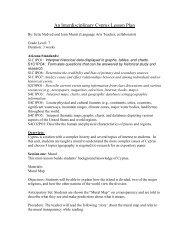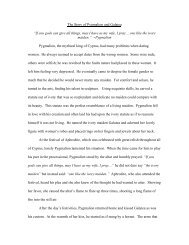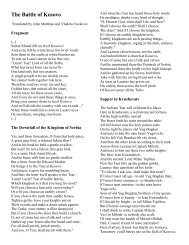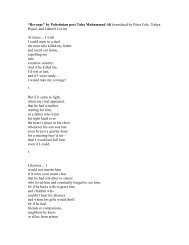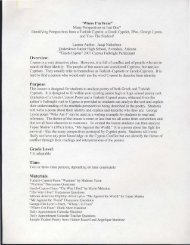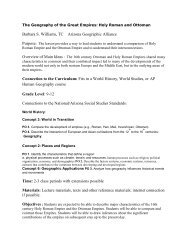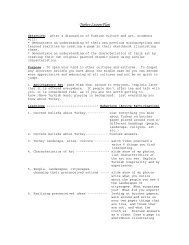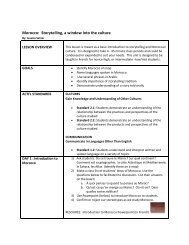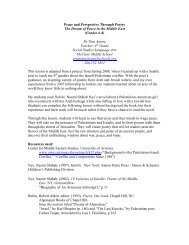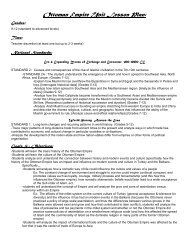You also want an ePaper? Increase the reach of your titles
YUMPU automatically turns print PDFs into web optimized ePapers that Google loves.
<strong>Answer</strong> <strong>Key</strong> - <strong>Note</strong> <strong>Taking</strong> <strong>Worksheet</strong><br />
(<strong>Note</strong>: there is some extra information on this sheet that is not on student handout)<br />
Ancient Times<br />
The oldest remains of the island of Cyprus come from the Neolithic Age, in 8200 – 3900 B.C.E These people used stone, and<br />
later, pottery, to store food.<br />
Between the Stone Age and the Bronze Age, 3900 – 2500 B.C.E., the people of the Chalcolithic Age were the first to discover<br />
copper on the island. The word Cyprus comes from the Greek word for copper – Kypros.<br />
During the Bronze Age, 2500-1050 B.C.E., copper was traded within the region and wealth was brought to Cyprus.<br />
Cyprus was conquered and ruled by many different peoples including ancient Greeks, Phoenicians, Assyrians, Egyptians,<br />
Persians, Romans, Byzantines, and even Richard the Lionheart and the Knights Templar.<br />
Roots of Religion<br />
From 1489-1571 C.E., The Venetians ruled Cyprus. They constructed the walls surrounding Nicosia and Famagusta to protect<br />
themselves from the Ottomans. The major religion was the Latin Church, or Catholicism.<br />
In 1570, Ottoman troops invaded Cyprus and many Catholics were either expelled or converted to Islam, the religion of the<br />
Ottomans. For the next 307 years, from 1571-1878 C.E., the Ottomans ruled Cyprus.<br />
Modern Times<br />
The 1878 Cyprus Convention gave Britain administration of the island because of their support of the Ottomans during the<br />
Russian-Turkish war. Because Turkey was allied with the Germans during WWI, Britain annexed the island in 1914. As a result of<br />
the Treaty of Lausanne in 1923, Turkey had to give up all rights to Cyprus. In 1925, Cyprus officially became a colony of Great<br />
Britain.<br />
Trouble Brews<br />
In the1930s, tired of being a colony, and hoping for independence, many Cypriots began pushing for Enosis, or union with Greece.<br />
There were many riots, and the British began referring to two separate groups living within Cyprus: Greek Cypriots and Turkish<br />
Cypriots. Greek Cypriots were remnants of the first Greek colonizers of Cyprus. They spoke Greek and practiced the Orthodox<br />
Christian religion and made up a majority of the population. Turkish Cypriots were descendants of the Turks/Ottomans from<br />
Anatolia. They spoke Turkish and practiced the religion of Islam and comprised about 20% of the population. These new labels<br />
caused many battles between the two groups from 1955-1959, with some Greek Cypriots pushing for Enosis, and some Turkish<br />
Cypriots pushing for a division of the island based on ethnicity.<br />
In 1960, Cyprus gained its independence from Britain and established the Republic of Cyprus, complete with a constitution. The<br />
constitution was very complex and tried to make things fair for Turkish Cypriots, the minority, and Greek Cypriots the majority.<br />
Unfortunately the two sides eventually disagreed so much on the constitution that more fighting erupted.
The Situation Worsens<br />
During the 1960s and until 1973, Turkish and Greek Cypriots began living separately out of fear. Turkish Cypriots were forced to<br />
live in certain areas within Cyprus called enclaves, and Greek Cypriots tried to keep shipments of food and medicine away from<br />
them. Some attacks occurred on the Turkish Cypriots also. In1964, the United Nations sent in a peace keeping force to help, but it<br />
was not successful.<br />
Summer 1974<br />
In 1974, a military group in Greece authorized a coup to overthrow the leader of Cyprus. A coup is short for coup d'état<br />
(pronounced 'kū dā ta'). It means the sudden overthrow of a government, and it is usually done by a small group that just replaces<br />
the top power figures. The term is French for "a sudden stroke or blow.” They replaced the leaders of Cyprus with those that were<br />
for Enosis, or union with Greece.<br />
When Turkey heard of this, they used the 1959 Treaty of Guarantee to invade Cyprus. The treaty stated that Turkey should<br />
“prohibit . . . all activity having the object of promoting directly or indirectly either the union of the Republic of Cyprus with any other<br />
State, or the partition of the Island.” Many argue that Turkey had no rights to do this based on the Treaty of Lausanne in1923<br />
when they gave up all rights to Cyprus.<br />
The UN tried to negotiate peace, but it wound up sending in 40,000 troops on the north coast. Thousands were injured, killed, or<br />
are still missing. Around 200,000 Greek Cypriots had to move to the South, leaving all their belongings and homes, while Turkish<br />
Cypriots were forced to move north, also leaving everything behind.<br />
Today<br />
Today, a 187 mile line, called the Green Line, still divides the island into northern and southern Cyprus. Most Greek Cypriots live<br />
in the south, called the Republic of Cyprus, which makes up 66% of the island, and most Turkish Cypriots live in the north, called<br />
the Turkish Republic of Northern Cyprus (TRNC), which is not recognized by the United Nations.<br />
The UN set up a buffer zone along this line. On parts of the buffer zone, no one is allowed to live or settle and other parts are<br />
accessible.<br />
In 2003, part of the line that separates Cyprus was opened. Now, Turkish and Greek Cypriots may cross the line after 30 years of<br />
separation. There were hopes for unification and peace, but in 2004 the referendum for unification was defeated. The Republic of<br />
Cyprus has entered the European Union, while the TRNC remains unrecognized by the United Nations.
Assessment<br />
1. List at least two reasons why people live where they do. One reason must be based on physical geography.<br />
Give specific examples.<br />
2. What about the location of Cyprus makes it desirable for centuries? Give at least 2 examples.<br />
3. Describe at least two of the factors that contributed to the division of the country of Cyprus.


